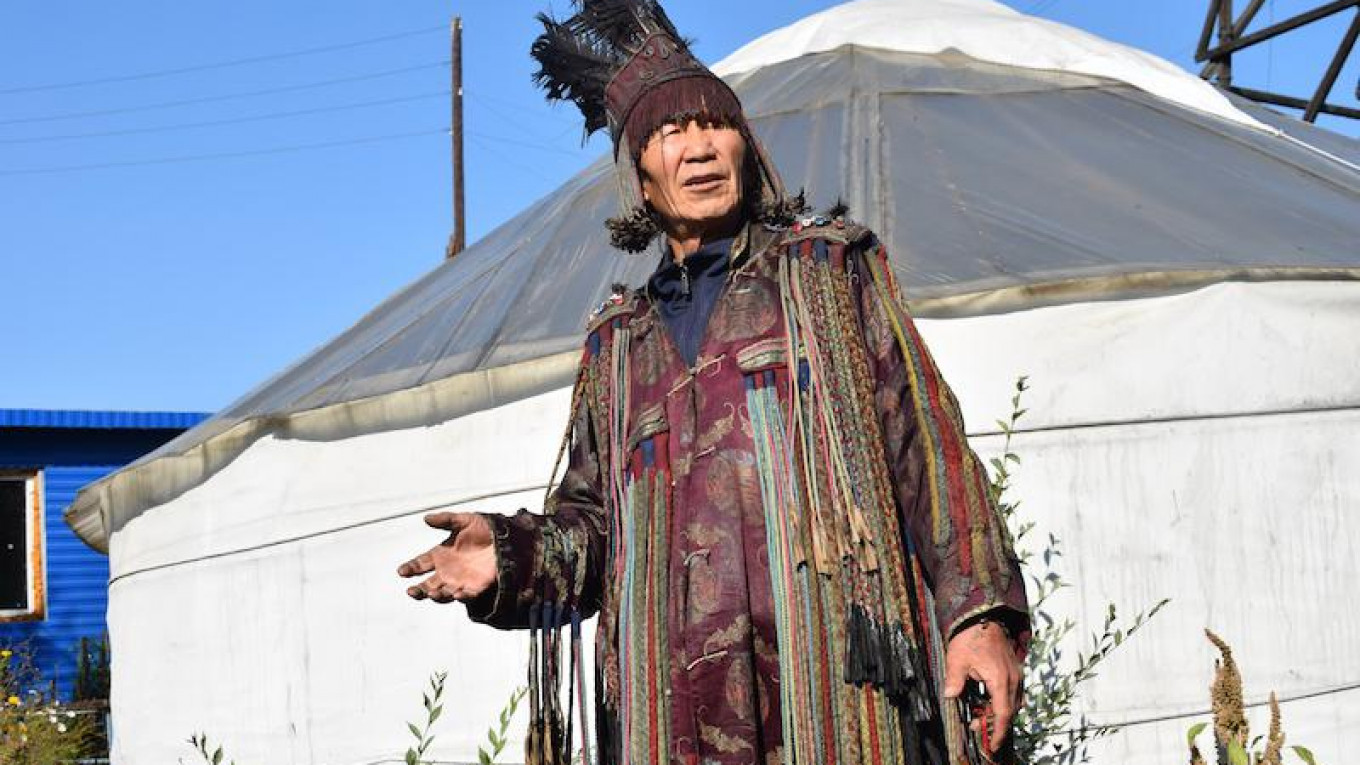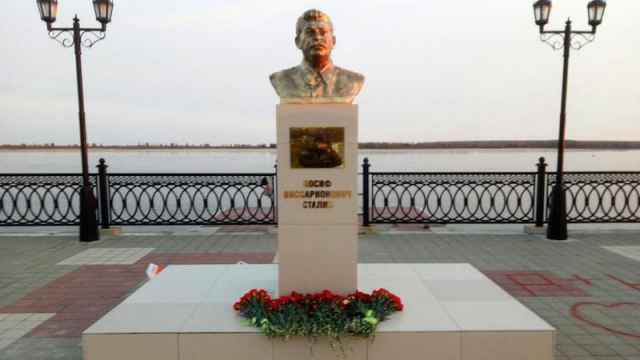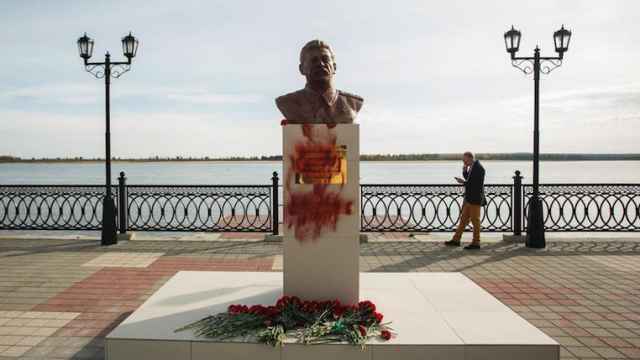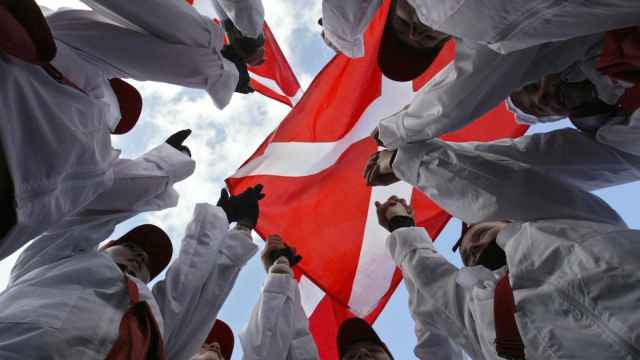Taking a drag from a cigarette on his living room couch, Dugar-Syuryun Oorzhak looks like an ordinary Tuvan man. But when he slips into his piebald leather coat, puts on his feathered headdress, and takes down the skin drum hanging on the wall, he is transformed into a shaman and a healer.
“You’ve all become too civilized,” he says, sizing up the two correspondents from The Moscow Times. “You need to buy a yurt and move back to nature.”
In Tuva, a remote ethnic republic in southern Siberia, Oorzhak is the real deal. Descended from a shamanic family, he helps his fellow Tuvans resolve problems ranging from interpersonal conflict to illness. And he can be partially credited with reviving the practice of Shamanism, long suppressed by the Soviets. In 1993, Oorzhak filed the official paperwork to found Dungur (“Drum”), the first post-Soviet Shamanist association in Russia.
The organization opened at the right time. As the Soviet collapse gave way to national cultural revival, Tuva witnessed a renewed interest in Shamanism and the region’s other traditional faith, Buddhism.
Today, however, Oorzhak has grown dissatisfied. Shamanism “has become a business,” he says. Russians come from Moscow for a few meetings with a shaman, and then head home to open their own shamanic clinics. Locals declare themselves shamans with the sole aim of making money.
“Now they’re even establishing set prices for their rituals!” he says, shaking his head. “You can’t do that. People come for help and they bring you whatever they can.”
Ancient Faith
Shamanism refers to an ancient group of indigenous spiritual practices that harness altered states of consciousness to engage with the supernatural. A shaman supposedly acts as an intermediary between the human and spirit worlds, entering a trance-like state during ritual ceremonies and drawing healing energy from benevolent spirits. For this reason, Mircea Eliade, the seminal Romanian researcher on Shamanism, defined the faith as a “technique of ecstasy.”
Siberia is commonly regarded as the heartland of Shamanism. Indigenous communities have practiced shamanic rituals here for thousands of years, though the tradition hasn’t always gone unhindered.
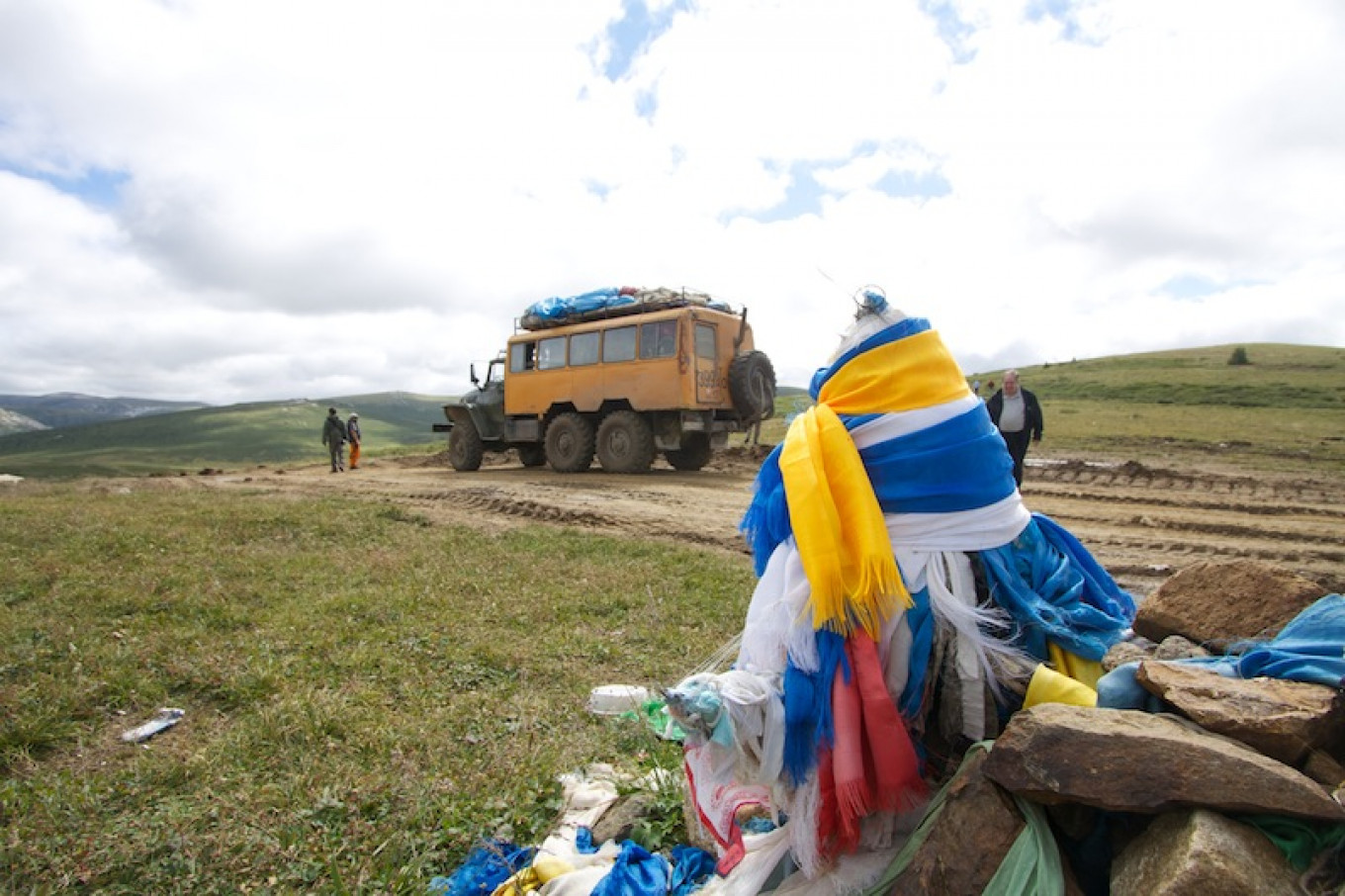
In the 16th and 17th centuries, as the Russian Empire expanded eastward, Orthodox Christianity came into aggressive conflict with indigenous traditions. And after the founding of the Soviet Union, a dogmatic approach to Marxist-Leninist ideology put the regime in direct conflict with spiritual, “unscientific” practices.
Until the Gorbachev era, indigenous spirituality was a risky venture. The standard narrative of Shamanism under the Soviets includes stories of mass executions of shamans. Some reports even describe shamans being thrown to their deaths from helicopters.
But Valentina Kharitonova, an anthropologist and expert on Shamanism, says that studying Soviet arrest records reveals a more complicated story. At the time of the Soviet anti-religious campaign, Shamanism was not even viewed as a religion. Shamans were indeed repressed, but often because they were wealthy, not for their spiritual practices. Shamanism was also connected with animal sacrifice, and slaughtering livestock intended for collectivization violated Soviet law.
In fact, in the early communist period, many shamanic healers simply gave up the practice.
“Some shamans sold their costumes and drums to museums because they saw there was no more need for them,” Kharitonova says. “They saw their work being replaced by doctors.”
But Shamanism never fully died out in places like Tuva. Accessible only by a five-hour car ride through the Sayan Mountains, Tuva remains one of Siberia’s most remote areas and among the least “Russian” regions in Russia. In the 1970s and 1980s, researchers even discovered elderly shamans still plying their trade in the isolated regions of the republic. Unsurprisingly, the post-Soviet revival of the practice was particularly swift in Tuva.
Old Meets New
Oorzhak’s life story directly reflects Shamanism’s turbulent 20th century history. Born in 1948 in the Tuvan village of Kydyy-Shurabulak, Oorzhak says he was especially close to his grandfather, Oorzhak Dongak Shokar, who was considered a “master shaman.” Shokar was imprisoned for over 8 years — Oorzhak says for simply being a shaman.
As a result, the young Oorzhak was never allowed to join the Pioneer scouting organization, the Communist Youth League, or the Communist Party — important channels of status and opportunity in the Soviet system. Instead, he became an artist and helped design the Tuvan capital of Kyzyl’s picturesque National Theater.
But Shamanism was in Oorzhak’s blood and, as he describes it, he “gradually and intuitively” became a shaman — almost without noticing how it happened. Throughout the Soviet period, he healed people in private, helping to “remove bad energy, jealousy, envy, and bad thoughts” that cause illness at a time when the government regarded such ideas as backwards relics of the past.
With the Soviet collapse, Oorzhak gained prominence for his rituals and his success in registering the Dungur organization. Soon, he was being contacted by people from the Khakasia and the Altai republics, who asked for his help in starting organizations there.
Since the 1990s, Oorzhak says, enthusiasm for Shamanism has declined “slightly.” At the same time, Tuvan regional authorities and the local population support Shamanism. It has also become an important, if routine, part of the region’s culture.
And interest outside Siberia has grown significantly. Now, visitors come from elsewhere in Russia, Europe, and North America to learn about Tuva’s spiritual practices. Oorzhak welcomes these visitors and takes them on tours of sacred spots where shamanic rituals are carried out.
Dr. Michael Harner, an American anthropologist who left academia to promote a modern form of Shamanism, suggests that this interest is a symptom of modernity. The “age of science” has superseded religious faith and left many people dissatisfied with established religions.
In contrast, Shamanism “goes directly to the origins of great religions,” he says. “It is a method of direct revelation.”
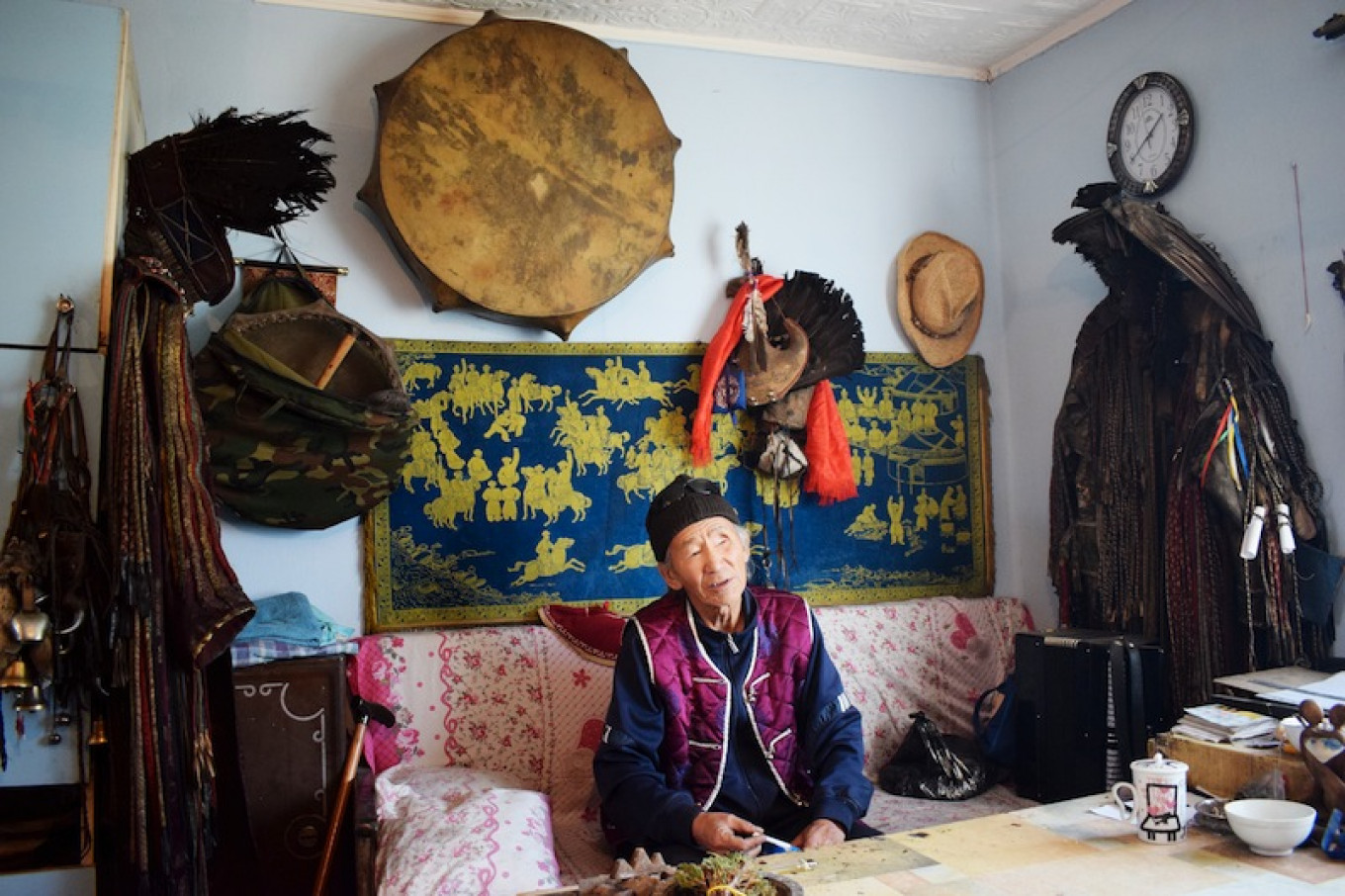
Faith and Commerce
Despite his work with tourists, Oorzhak is determined not to allow commercialism to erode Tuva’s local spiritual traditions. The house where he lives on the banks of the Yenisei river is clean, but dilapidated. Clients still show up unannounced at his door bearing small offerings of food in return for a consultation. He admits finances are a problem, but says he’s determined to keep things simple.
In this regard, Oorzhak is a holdout. Anthropologist Kharitonova sees nothing surprising in the monetization of Shamanism. Even in the days of yore, she says, shamans had to support themselves and their families through their rituals. With the collapse of the Soviet safety net, this has become more urgent.
“Commercialization is a natural process,” she says. “Today we pay for everything with money, and a person can’t afford to give the shaman several reindeer or goats [for his services].”
And even Oorzhak is not immune to the wiles of “commercial” Shamanism. Because of international interest in Siberian spirituality, he has become one of the most popular Tuvan shamans in the West. He frequently receives invitations to conferences and seminars abroad, which have allowed him to meet shamans from around the world.
He travels abroad about five or six times a year, funded by the inviting organizations. He recounts with pride the places he has visited: the U.S., Mexico, Peru, Brazil, Japan, and Europe.
“You know,” he says with a knowing smile, “when you get a Schengen visa, you travel across the whole of Europe by car!”
A Message from The Moscow Times:
Dear readers,
We are facing unprecedented challenges. Russia's Prosecutor General's Office has designated The Moscow Times as an "undesirable" organization, criminalizing our work and putting our staff at risk of prosecution. This follows our earlier unjust labeling as a "foreign agent."
These actions are direct attempts to silence independent journalism in Russia. The authorities claim our work "discredits the decisions of the Russian leadership." We see things differently: we strive to provide accurate, unbiased reporting on Russia.
We, the journalists of The Moscow Times, refuse to be silenced. But to continue our work, we need your help.
Your support, no matter how small, makes a world of difference. If you can, please support us monthly starting from just $2. It's quick to set up, and every contribution makes a significant impact.
By supporting The Moscow Times, you're defending open, independent journalism in the face of repression. Thank you for standing with us.
Remind me later.


